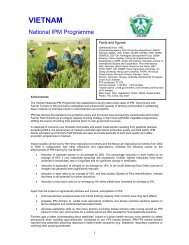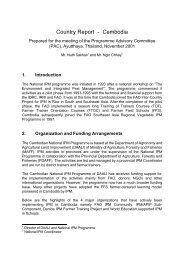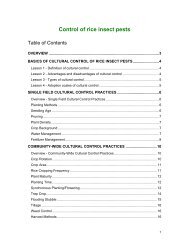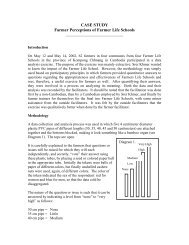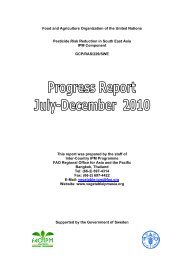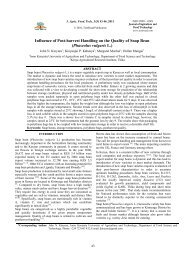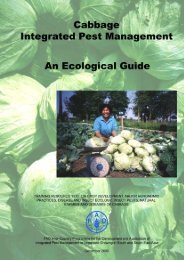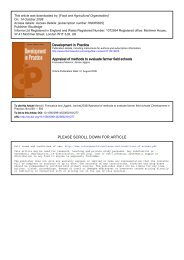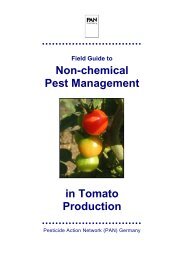Eggplant Integrated Pest Management AN ECOLOGICAL GUIDE
Eggplant Integrated Pest Management AN ECOLOGICAL GUIDE
Eggplant Integrated Pest Management AN ECOLOGICAL GUIDE
Create successful ePaper yourself
Turn your PDF publications into a flip-book with our unique Google optimized e-Paper software.
__________________________________________________________________Major Natural Enemies of <strong>Eggplant</strong> Insect <strong>Pest</strong>sMost beneficial insect parasitoids are wasps but there are also flies and other insects that areparasitoids.Parasitoids are usually smaller than their host and they are specialized in the choice of their host. Theyusually attack only one stage of the host insect: eggs, larvae or pupae. Parasitoids are often called aftertheir stage preference, for example “egg parasitoids” attack only eggs of a particular insect. Only femalessearch for hosts, they usually lay eggs in or near the host.SEX: male or female...? ♂♀In wasps, the sex of a parasitoid off-spring is determined differently than for other animals. Inparasitic wasps, females come from fertilized eggs and males come from unfertilized eggs. So if afemale does not mate with a male wasp, she will produce only males. If she does mate, she willproduce a mix of both males and females, usually more females. And that is important because onlyfemales are able to parasitize other insects! Males are only useful for mating...!Whereas insect predators immediately kill or disable their prey, pests attacked by parasitoids die moreslowly. Some hosts are paralyzed, while others may continue to feed or even lay eggs before they diefrom the parasitoid attack. Parasitoids, however, often complete their life cycle much more quickly andincrease their numbers much faster than many predators.Parasitoids are following the pest population. Unlike predators, they cannot increase their own populationwithout their host insects. It is therefore always good to have at least a few pest insects in the field. Theyserve as food and as a host for the natural enemies!Parasitoids can be the dominant and most effective natural enemies of some pest insects, but becausethey are so small, their presence may not be obvious. This is why it is so important to monitor fields orthe friends or the farmer will never be noticed, in fact, will perhaps be treated with pesticides instead ofgratitude!A parasitoid parasitized??Yes, unfortunately, it is possible: a parasitoid of insect pests can be parasitized by other parasitoids:this is called hyperparasitism. Hyperparasitoids are even smaller than parasitoids. Hyperparasitismcan be common, and may reduce the effectiveness of some beneficial species, especially in case ofintroduced natural enemies (those natural enemies that are brought into a field from outside). Littlecan be done to manage hyperparasitism.The life cycle and reproductive habits of beneficial parasitoids can be complex. In some species only oneparasitoid will develop in or on each pest while in others hundreds of young larvae may develop within asingle host.Most parasitoids only attack a particular life stage of one or several related species. The immatureparasitoid develops on or within a pest, feeds on body fluids and organs, and either comes out of thehost to pupate or emerges from the host as an adult. The life cycle of the pest and parasitoid cancoincide, or that of the pest may be altered by the parasitoid to accommodate its development.To determine if there is any parasitism and to what extent, it is often necessary to rear samples of pestinsects to see if any adult parasitoids emerge. See section 4.3.Some parasitoids take longer to develop than their host. To study these parasitoids, it is important to beable to rear the collected egg masses or immature stages of the insects. If collected material is kept insuitable containers or cages, be sure to keep specimen for at least one month and even after it looks likeeverything has already emerged.Related exercises from CABI Bioscience/FAO Vegetable IPM Exercise Manual1.6 Show effects of beneficials incl. natural enemies105<strong>Eggplant</strong> Ecological Guide



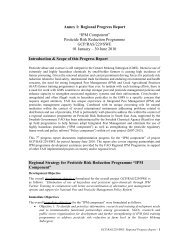
![Section 4 [ PDF file, 252 KB] - The Field Alliance](https://img.yumpu.com/51387260/1/158x260/section-4-pdf-file-252-kb-the-field-alliance.jpg?quality=85)
